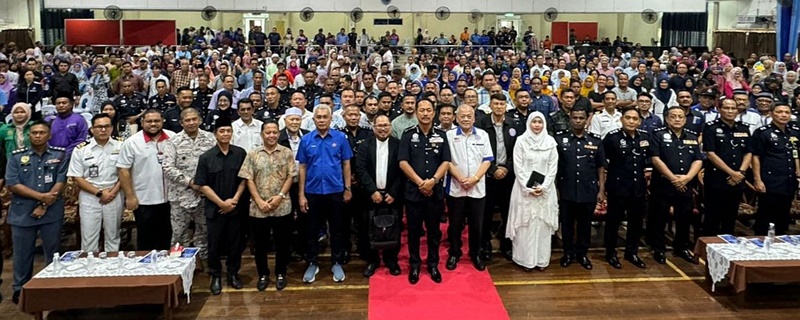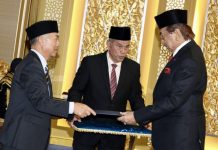SANDAKAN: Tan Sri T.C Goh, President of The Federation of Chinese Associations Malaysia (Huazong), has expressed concern that due to their multilingual proficiency, Malaysian Chinese youths have become targets for recruitment by international fraud syndicates to carry out a wide range of scams.
He said the multilingual advantage of Malaysian Chinese youths has turned them into convenient tools for illegal activities by fraud syndicates, and it is a matter of great concern that is worth paying serious attention to.
He added that these syndicates are also known for exploiting advanced technologies such as artificial intelligence (AI) to facilitate their unlawful activities.
Goh, who is also the Chairman of the Malaysia Crime Prevention Foundation (MCPF), Sabah Liaison Committee, made these remarks at the anti-fraud and anti-drug seminar held at the Sandakan Community Hall, today. The seminar was co-organized by the MCPF Sabah Chapter, Sabah police, and the University Malaysia Sabah (UMS), Sandakan Campus. Other keynote speakers included Sabah Police Commissioner Datuk Jauteh Dikun and Professor Azwan Awang from the UMS.
Goh noted that Malaysian Chinese youths, including those in Sabah, possess language skills that allow them to speak English, Mandarin, and various dialects such as Hokkien and Hakka, making them prime targets for international fraud syndicates.
“These international fraud syndicates often have members who are proficient in multiple languages and dialects, enabling them to use technology and the internet to conduct scams abroad,” he said.
Goh, who is also President of the Federation of Chinese Associations Sabah (FCAS), observed that common fraud methods often exploit a person’s greed or desire for romantic relationships. He thus reminded that the popular principle of “there’s no such thing as a free lunch” remains unchanged.
“It’s important that we understand ourselves better. For instance, if a person is already 60 years old and not very agile, even if a ‘handsome or beautiful’ person appears, what are the chances? Self-awareness would indicate that this is unrealistic, or too good to be true!” he cited.
He explained that many syndicates or criminals often exploit people’s “minor greed” by offering small incentives or benefits, in the beginning. Once the target takes the bait, this “minor greed” escalates into “major greed,” falling deeper into the trap. A common example in recent years is online investment scams, which use “long-term baiting” strategies to lure victims to invest more money, ultimately losing both their capital and returns, resulting in significant financial loss and debt to family and friends.
“Another popular scam in recent years is the ‘piglet’ (human trafficking) scam, where victims are lured abroad with promises of high income job and a better life, only to end up being part of a fraud syndicate conducting online scams at border areas,” he highlighted.
Goh cautioned that with fraud and criminal activities constantly evolving, the Malaysian public must constantly remain vigilant.
“In today’s digital age, with the prevalence of smartphones and the advancing capabilities of AI that can mimic voices and appearances, it becomes even harder to guard against scams.
“Recently, some irresponsible individuals even used my name and photo on Facebook to advertise an online stock investment course. I have clarified this matter and taken necessary actions,” he disclosed.
He also emphasized the importance of prudent financial management, cultivating good saving habits from a young age, working hard, living pragmatically, and avoiding over spending.
“Overspending beyond one’s means can lead a person to seeking “quick money” or even engaging in illegal activities, making one a target for criminal syndicates,” he cautioned.
Touching on anti-drug initiatives, Goh noted that the MCPF Sabah frequently collaborates with police and other law enforcement agencies, exchanging views and reaching consensus on various social issues, including crime and drug abuse. This collaboration includes strengthening police-community cooperation to maintain social order and prevent illegal drug activities and abuse.
The MCPF Sabah, with police support, also conducts anti-drug campaigns and seminars in schools, by inviting anti-drug ambassadors like Liang Wenfa to share their personal experiences, offering valuable lessons and awareness to students.-pr/BNN






